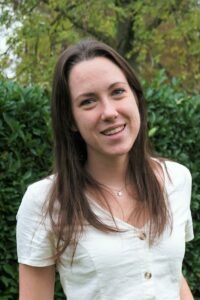If you read our post from last month, where we learned something about Ignacio, you already know that it’s been a year since all ESRs started their projects, and we are celebrating by giving them the opportunity to talk a bit about themselves and their work. And if you hadn’t read it, isn’t it convenient that I just summarized it for you?
It is now time to meet ESR 2: Loes Beckers, who is looking into Cognitive functions as process-related outcome measures and predictors of performance in adult Cochlear Implant users. Read on to learn more about Loes and her experience in MOSAICS so far.

How did you get into the field of Cochlear Implants?During my studies, cochlear implants were mentioned as amazing technical devices that can repair hearing. I was mainly taught about the anatomical mechanisms are replaced by them. MOSAICS is my first project working with cochlear implants. I think it wonderful what these implants can do, and I am happy to learn more about them.
Tell us about your research background?The first little research project I did was during my Bachelor in Psychology and Neuroscience. The idea of that project was to study how timing influences perception of visual and auditory stimuli. Since then, I knew for sure that I wanted to continue doing research. I did studies focusing on brain waves and visual perception and prediction in speech perception. I had the privilege to work with EEG and MEG in wonderful research groups at Maastricht University and MRC CBU Cambridge. I am still very grateful for everything that I learned from these projects. The topics that I studied during these times definitely influence some of my decisions and research design during the MOSAICS project.
Loes’ 15 second #MyJobInResearch video.
Since the focus on cognition in cochlear implant users is relatively new, it feels like having to pave an entirely new path. This is a wonderful challenge
What are your aspirations for your research? I hope to gain better insight into speech perception processes in cochlear implant users, and the involvement of cognitive factors within these processes. I believe a better understanding of these processes is part of creating better rehabilitation programs for every unique cochlear implant patient.
What’s the biggest challenge you’re currently facing during your research?I think the complexity of cognition is the biggest challenge. There are many ways to approach cognition and its different aspects within research. Since the focus on cognition in cochlear implant users is relatively new, it feels like paving a new path. This is a wonderful challenge, and it gives me lots of freedom to explore the aspects that I am most interested in.
What are the most important qualities you consider a researcher should have? This question reminds me of how a previous supervisor once told me that he, a very experienced researcher, still wanted to grow in the ability to not only advocate his own views and research but also genuinely understand other researchers’ opinions and criticism or questions. Being open-minded instead of only defending what you stand for is a valuable quality to have as a researcher.
What is your favourite memory during Mosaics so far? This is a great question, there are already many things to choose from. I really liked the introduction day, my trip to Germany and the Freshers week. I also very much enjoy the days I get to spend in the lab. But I think what I liked the most is the training week last Autumn in Nijmegen. Even though the days were long, we had a lot of fun and stayed in a wonderful venue in the middle of nature. Being able to get to know my fellow ESRs even better, but also having inspiring discussions with the supervisors was of great value.
Being open-minded instead of only defending what you stand for is very valuable as a researcher.
How has the experience been during Covid? It was definitely an extra challenge. I feel like Covid slowed down the world, and therefore also the MOSAICS project a little bit. But having to move everything online also brought very nice things, like being able to follow online lectures of great speakers that I would not have been able to attend otherwise.
Has being in part of a team helped you with the uncertainties of a PhD? I think being part of a team always makes the experience ten times better. Not only is sharing expertise a pro, but also sharing motivation and the experience in general.
Which activities do you enjoy besides research? I love meeting up with friends, having dinner together or travelling together. Furthermore, I really like doing creative projects, like sewing, decorating, and painting. Also, I love to sing and read books.
What is your favorite book? My favourite writer is Dan Brown. The trillers that he writes are not only very entertaining story-wise, but they also discuss interesting topics such as science, religion, climate, and evolution. I can read these books over and over and still be surprised about some of the details mentioned in the books.
